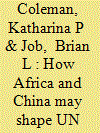| Srl | Item |
| 1 |
ID:
180371


|
|
|
|
|
| Summary/Abstract |
UN peacekeeping became a flagship activity of the liberal international order (LIO) in the post-Cold War era, characterized by globalization, liberal norms and western leadership. Western states' diminished support for LIO UN peacekeeping has left it increasingly open to challenge, but significant changes are only likely if a strong group of states coalesces around an alternative model of UN peacekeeping. This article highlights African actors and China as well positioned to play pivotal roles in such a coalition. African states, who host the preponderance of UN missions and furnish almost half of the UN's uniformed peacekeepers, support globalized UN peacekeeping, show relatively weak support for the most liberal peacebuilding principles and assert the need for African-led solutions to continental crises. China's influence reflects its P5 status, financial and personnel contributions to UN peacekeeping and engagement with regional actors, notably in Africa. Aspiring to global leadership and a ‘new world order’, China endorses globalized UN peacekeeping but proposes a non-liberal (and non-western led) notion of ‘developmental peace’ to guide it. The complementarities between African and Chinese priorities raise the possibility of a profound challenge to LIO peacekeeping. Rather than heralding deglobalization, however, this challenge illustrates that post-LIO international institutions may instead be characterized by deliberalization and dewesternization.
|
|
|
|
|
|
|
|
|
|
|
|
|
|
|
|
| 2 |
ID:
076779


|
|
|
|
|
| Publication |
2007.
|
| Summary/Abstract |
After a temporary downturn in many Asian states after the 1997 Economic Crisis defence expenditures are rising again. Although most states put internal and transborder security issues at the top of their list of potential threats, an examination of recent trends in regional defence expenditure trends and weapons acquisition patterns belies this. Resources are being directed predominately toward externally oriented weapons systems such as fighter aircraft, surface ships, submarines, and missiles of all types. The dramatic accumulation of such potentially destabilizing weapons systems, particularly in Asia's traditional flashpoints, risks fuelling competitive arms processes throughout the region.
|
|
|
|
|
|
|
|
|
|
|
|
|
|
|
|